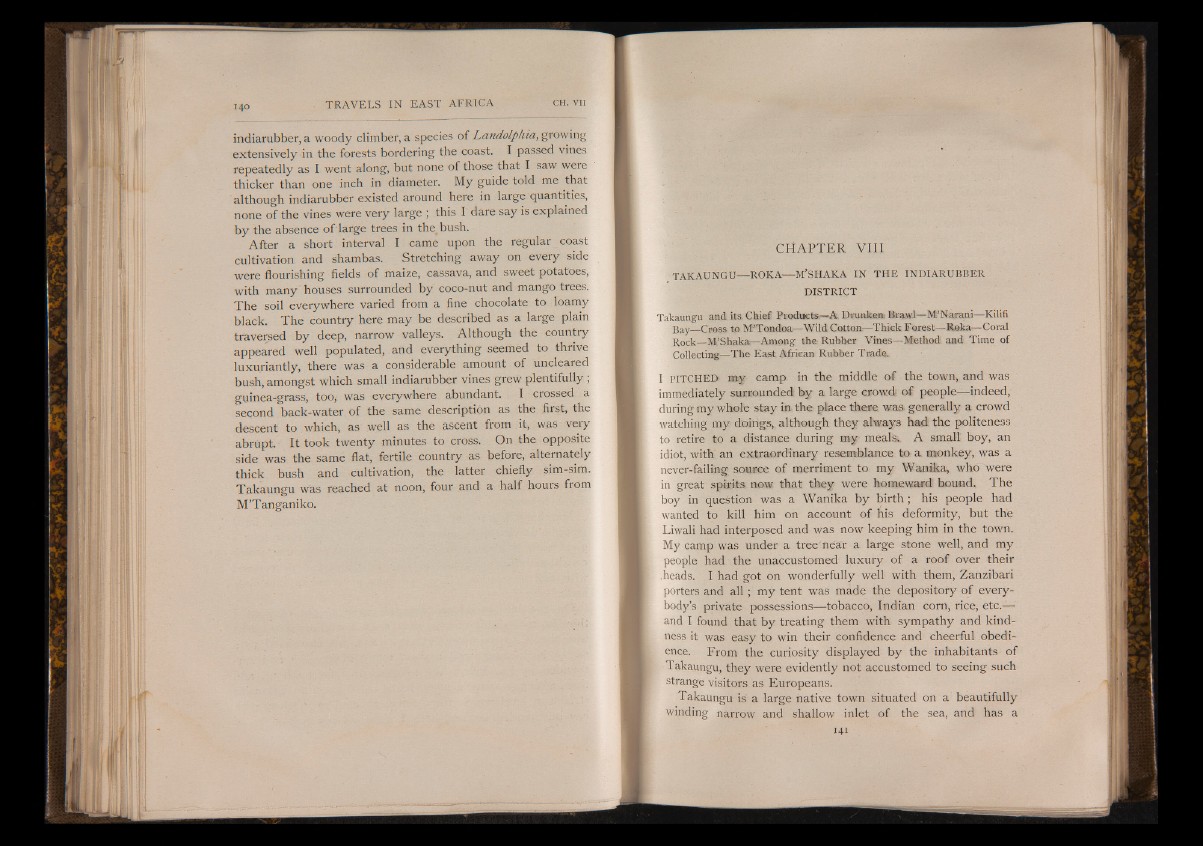
indiarubber, a woody climber, a species of Landolplna, growing
extensively in the forests bordering the coast. I passed vines
repeatedly as I went along, but none of those that I saw were
thicker than one inch in diameter. My guide told me that
although indiarubber existed around here in large quantities,
none of the vines were very large ; this I dare say is explained
by the absence of large trees in the^ bush.
After a short interval I came upon the regular coast
cultivation and shambas. Stretching away on every side
were flourishing fields of maize, cassava, and sweet potatoes,
with many houses surrounded by coco-nut and mango trees.
The soil everywhere varied from a fine chocolate to loamy
black. The country here may be described as a large plain
traversed by deep, narrow valleys. Although the country
appeared well populated, and everything seemed to thrive
luxuriantly, there was a considerable amount of uncleared
bush, amongst which small indiarubber vines grew plentifully ;
guinea-grass, too, was everywhere abundant. I crossed a
second back-water of the same description as the first, the
descent to which, as well as the ascent from it, was very
abrupt. It took twenty minutes to cross. On the opposite
side was the same flat, fertile country as before, alternately
thick bush and cultivation, the latter chiefly sim-sim.
Takaungu was reached at nopn, four and a half hours from
M’Tanganiko.
CH AP TER VIII
TAKAUNGU—ROKA—M’SHAKA IN THE INDIARUBBER
DISTRICT
Takaungu and its, Chief Products— A Drunken, Brawl— M’Narani— Kilifi
Bay— Cross to M’Tondoa—Wild Cotton.—Thick Forest— Roka— Coral
Rock—M’Shaka— Among the Rubber Vines— Method and Time of
Collecting— The East African Rubber Trade.
I PITCHED my camp in the middle of the town, and was
immediately surrounded by a large crowd of people— indeed,
during my whole stay in the place there was generally a crowd
watching my doings, although they always had the politeness
to retire to a distance during my meals* A small boy, an
idiot, with an extraordinary resemblance to a monkey, was a
never-failing source of merriment to my Wanika, who were
in great spirits now that they were homeward bound. The
boy in question was a Wanika by birth; his people had
wanted to kill him on account of his deformity, but the
Liwali had interposed and was now keeping him in the town.
My camp was under a tree'near a large stone well, and my
people had the unaccustomed luxury of a roof over their
.heads. I had got on wonderfully well with them, Zanzibari
porters and a ll; my tent was made the depository of everybody’s
private possessions— tobacco, Indian corn, rice, etc.—
and I found that by treating them with sympathy and kindness
it was easy to win their confidence and cheerful obedience.
From the curiosity displayed by the inhabitants of
Takaungu, they were evidently not accustomed to seeing such
strange visitors as Europeans.
Takaungu is a large native town situated on a beautifully
winding narrow and shallow inlet of the sea, and has a
141